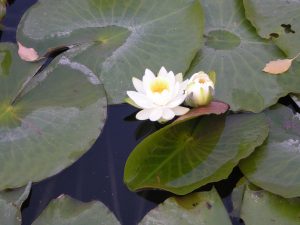
By Ed Oasa
I struggle with my illness and wonder, “Why is this happening to me?”
In Shinran Shonin’s text, Kyogyoshinsho (Teaching, Practice, Realization of the Pure Land Way), he wrote about the difficulties of accepting the Dharma through one’s efforts. I’m experiencing this firsthand as I face my doctor’s most recent and bleak medical diagnosis. I feel Shinran’s writings are true and real.
A year ago, I wrote an essay titled “Facing Humility,” about my embrace of Jodo Shinshu Buddhism. Before, I wasn’t very religious.
Four years ago, I began treatment for blood cancer. Two years later, I suffered a near-fatal bout of pneumonia, After recovering, I began studying Jodo Shinshu.
My illness happened over a short period and left me disabled and dependent on supplemental oxygen. It forced me to retire from my profession as a private investigator, which I enjoyed for more than 20 years.
How does this happen, I asked, and in such a short time… to me? I was in total awe of change, wondering how these events came out of nowhere. This awe I felt was humbling, and in my down moments, humiliating.
Jodo Shinshu teachings of humility and selflessness, challenging my delusional, ego-based self, helped me come to terms with my illness and disability.
I wouldn’t come to this acceptance without listening to the Shin teachings. These teachings manifest the great Dharma truth of impermanence. As Rev. Ken Yamada said in his Buddhism class, Dharma truth is spelled with a “big T.”
In the book, River of Fire, River of Water, the late Shin scholar Taitetsu Unno shared a popular Shin saying: “Illness, too, is my good friend.” Dr. Unno understood there’s something liberating about humiliation.
Earlier this year, I felt pretty good about life. I was less dependent on my portable oxygen and my pulmonary function readings improved. Doctors told me I probably don’t have to worry about cancer returning. I was in remission nearly three years.
In June, another diagnosis came as a shock. Cancer had returned with a vengeance. It wasn’t merely a relapse, but a progression of my first disease. It’s probably the disease that blood cancer patients fear most.
I was told there’s no cure. But if I didn’t receive treatment, I’d only live another eight to twelve weeks. With chemotherapy and maybe with new drugs in clinical trials, I could prolong my life. I know chemotherapy’s efficacy declines over time. Surviving another three years, as a doctor said, is “rare.”
You can imagine, those same ego-driven questions as before filled my head with a vengeance, like a cancer. How could this happen again? I could hardly believe it. I was deflated. I felt robbed of life. I felt the same in 2016 when first diagnosed with cancer, but back then, doctors talked about a potential cure.
Nowadays, fear and deep sadness ebb and flow throughout my house. For the past four years, my wife has been my caregiver. I feel guilty about the burden I’ve been to her, and now also, about the pain of eventually leaving her behind.
I feel this is classic dukkha. It’s the friction between my desires and the Truth of impermanence. As Dr. Nobuo Haneda of the Maida Center of Buddhism in Berkeley poignantly wrote, suffering is the struggle between the self and Dharma.
Whatever it’s called – friction, suffering, conflict – it doesn’t disappear. Ego drives people to be easily offended, hurt, envious, jealous, and angry. Knowing this truth provides little relief.
Since my diagnosis, I’ve stepped up my Jodo Shinshu studies. I’ve no choice but to deepen my understanding of Dharma through teachers I’ve met along the way. Why? Because Jodo Shinshu is about liberation from my ego and delusional thinking. Facing my illness ultimately means facing Truth by challenging and examining this self to see how temporary and impermanent it is—just like life.
Alone, I read Shin writings and Shinran’s Kyogyoshinsho. I attend virtual Sunday services and listen to Dharma talks by Rev. Ryoko Osa of Berkeley Higashi Honganji Temple. I participate in her weekly Shoshinge study class. For over a year, I’ve absorbed Haneda-sensei’s weekly lectures on Shinran’s writings and the Larger Sutra of Infinite Life. I also view talks about Buddhism on the Buddhist Churches of America Youtube channel.
I learned Buddhism is not an easy religion. Rev. Osa’s words forced me to reflect on the self. Haneda-sensei stresses Buddhism is “hard on you,” demanding we realize and face Truth. The Buddhist teachings truly are humbling.
Haneda-sensei says of the Three Treasures, Sangha is most important. It’s impossible to arrive at Truth by oneself. Life is full of temptations and distractions filling the mind of the ego self.
The Sangha has been invaluable to me. I’m grateful to everyone I’ve met. Reciting the Nenbutsu, “Namu Amida Butsu,” represents to me, hearing the Buddha’s call to abandon my ego self.
My time is limited. Shin teachings are really about having a reverence for the Truth. I find solace in what Buddhist teacher Manshi Kiyozawa calls “religious conviction,” which means entrusting in Truth. Belief in the Tathagata, he said, means “truth to be believed.” I’ll continue on this path towards accepting Dharma Truth.
Namu Amida Butsu
Read a followup to Ed’s story here.
-Mr. Oasa is a member of Berkeley Higashi Honganji Temple in California.

